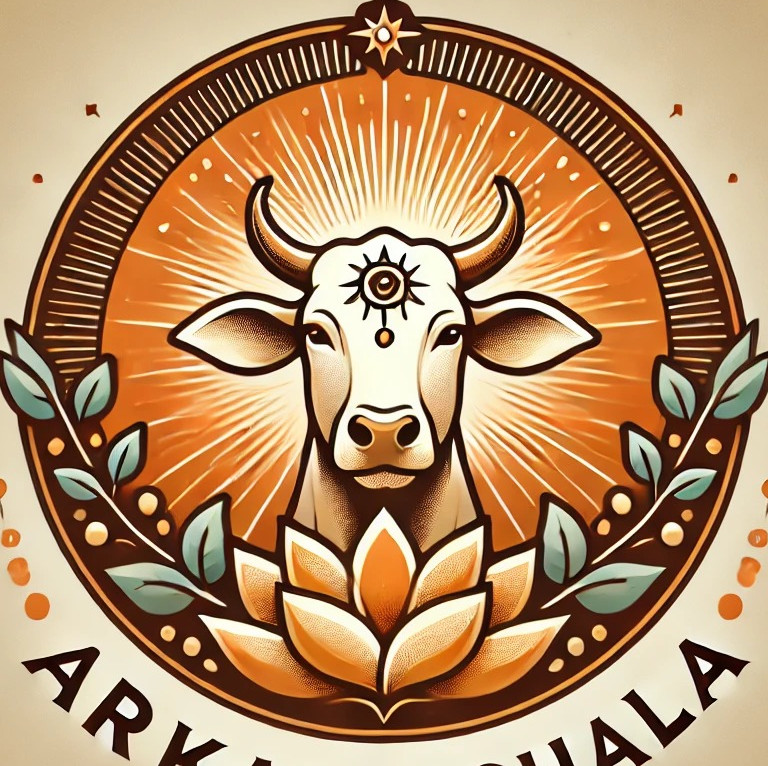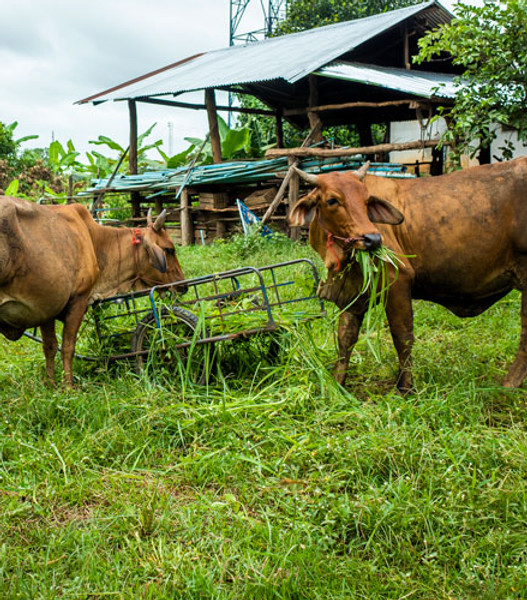
Discover Our Goshala
Explore the heritage and mission of Arka Goshala, where Vedic wisdom meets compassionate care for Bos indicus cows, nurturing harmony between humanity and nature.
Our History
Arka Goshala was established with a simple yet profound mission – to revive the ancient art of Vedic farming and honor the sacred role of cows in agriculture and human well-being. Founded, our sanctuary emerged from a deep reverence for Vedic wisdom and the timeless teachings of our ancestors.
In the Vedic tradition, cows are revered as divine beings, providing nourishment, fertility, and healing to both the land and its people. Recognizing the intrinsic connection between cows, farming, and human prosperity, Arka Goshala was created as a sanctuary where these sacred principles could be preserved and practiced.
Central to our vision is the belief that the healing power of cows extends beyond agriculture, offering solace and rejuvenation to those in need. Through the compassionate care of Bos indicus cows, we strive to uphold this ancient tradition, providing a sanctuary of peace and healing for all who seek it.
As we continue our journey, Arka Goshala remains committed to honoring the wisdom of our ancestors and cultivating a world of harmony, abundance, and spiritual fulfillment for generations to come.

Who we are
Arka Goshala is a dedicated non-profit organization established in 2023 with a singular commitment: the protection, nurturing, and improved well-being of Bos Indicus cows (also known as Desi or Indian native cows).
Since our founding, we have provided compassionate sanctuary and lifelong care for over 20 cows and calves, a number that continues to grow annually. Our core mission revolves around conservation, care, and compassion, working daily to ensure these sacred animals receive the respect and protection they profoundly deserve in a peaceful cow sanctuary setting.
What we do
Our Goshala remains a vibrant, year-round haven, offering diverse programs and unique experiences centered on cow protection, promoting compassion toward all animals, and meaningful community involvement.
-
Visit Our Cow Sanctuary: We host regular, engaging Goshala tours where visitors can spend quality time with our gentle cows and playful calves, learn about their holistic care, and experience their peaceful, calming presence.
-
Educational Programs: Beyond tours, we offer a range of activities designed to foster deeper connections, learning about the importance of native cow breeds, and overall well-being.
-
Community Connection: Join us in our mission to champion Bos Indicus conservation through volunteering, donations, and educational events.

Our Mission
Arka Goshala is dedicated to preserving Bos indicus cows and promoting Vedic farming practices. Our mission is to create a sanctuary where cows are revered and Vedic wisdom is upheld, fostering harmony between humanity and nature.


Our Vision
Our vision at Arka Goshala is to cultivate a world where the sacredness of cows is recognized, and Vedic farming practices thrive. We aspire to be a beacon of harmony, inspiring others to embrace sustainable living and honor the interconnectedness of all life.
Why Bos Indicus?
Bos Indicus cows, also known as zebu cattle, hold a unique place in agricultural landscapes worldwide. These remarkable animals not only contribute to cultural heritage but also offer invaluable economic and environmental benefits. Among the many advantages they bring, the production of A2 milk and its associated by-products stands out as a compelling reason for their protection.

Cultural and Religious Importance: Bos indicus cows hold immense cultural and religious significance in India, deeply ingrained in the fabric of the nation's traditions and beliefs. Revered as sacred beings in Hinduism, certain breeds like the Gir and Sahiwal are considered embodiments of divinity, associated with deities such as Lord Krishna and revered for their purity and gentle nature. Bos indicus cows are central to various religious rituals and ceremonies, where their milk, dung, and presence are integral components of offerings and worship. Additionally, these cows are vital to the agrarian economy, serving as sources of milk, labor, and fertilizer, further elevating their status in Indian society. Beyond their practical contributions, Bos indicus cows symbolize abundance, prosperity, and respect for all life, reflecting the profound spiritual connection between humans and animals in Indian culture.
Environmental Benefits: Bos Indicus cows play a crucial role in sustainable agricultural practices, particularly in regions with fragile ecosystems. Their grazing behaviors help maintain grasslands, promote soil fertility, and mitigate the risk of wildfires. By preserving these cattle, we contribute to broader conservation efforts aimed at preserving biodiversity and ecosystem health.
Why Protect Bos Indicus Cows?

Arka Goshala is located at 8028 FM 2153 in Aubrey, Texas. Our sanctuary is nestled in the serene countryside, offering a peaceful and picturesque setting for our residents and visitors. With its tranquil surroundings and convenient location, Arka Goshala provides a welcoming environment where Bos indicus cows are cherished, and Vedic farming practices are embraced.
The Value of A2 Milk and Its By-products
A2 Milk Quality: A2 milk, derived from Bos Indicus cows, is gaining recognition for its potential health benefits. Unlike conventional milk (A1 milk), which contains the A1 beta-casein protein variant, A2 milk contains only the A2 beta-casein protein. Many consumers report improved digestion and reduced discomfort after switching to A2 milk, making it a preferred choice for those with lactose intolerance or milk sensitivity.
Nutritional Superiority: Studies suggest that A2 milk may offer nutritional advantages over A1 milk. It contains essential nutrients such as calcium, protein, and vitamins, while its easier digestibility may enhance nutrient absorption. As consumers increasingly prioritize health-conscious choices, A2 milk emerges as a compelling option for those seeking a wholesome dairy product.
Diverse By-products: Beyond milk, Bos Indicus cattle offer a plethora of valuable by-products. These include ghee (clarified butter), yogurt, cheese, and traditional medicines derived from cow urine and dung. Each of these by-products serves diverse culinary, medicinal, and cultural purposes, enriching various aspects of human life and well-being.
Conclusion:
Protecting Bos Indicus cows is not merely an act of conservation but a celebration of cultural heritage, economic sustainability, and environmental stewardship. By safeguarding these remarkable animals and promoting the production of A2 milk and its by-products, we honor their multifaceted contributions to society and pave the way for a healthier, more sustainable future.
